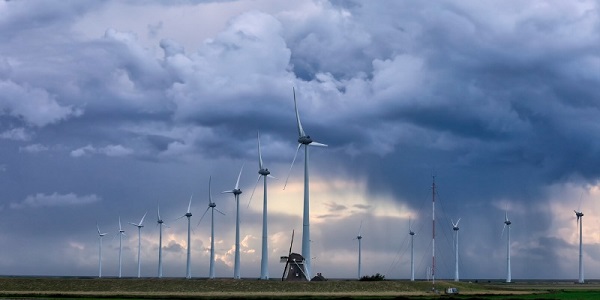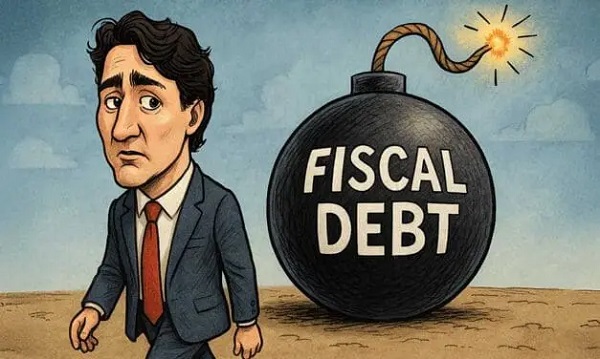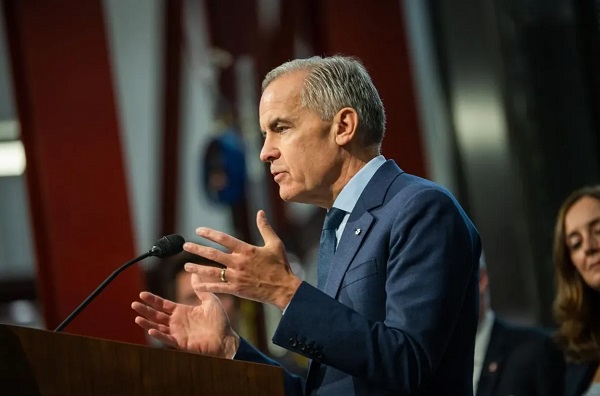Economy
Canada should not want to lead the world on climate change policy

From the Fraser Institute
Some commentators in the media want the the federal Conservatives to take a leadership position on climate, and by extension make Canada a world leader on the journey to the low-carbon uplands of the future. This would be a mistake for three reasons.
First, unlike other areas such as trade, defence or central banking, where diplomats aim for realistic solutions to identifiable problems, in the global climate policy world one’s bona fides are not established by actions but by willingness to recite the words of an increasingly absurd creed. Take, for example, United Nations Secretary General António Guterres’ fanatical rhetoric about the “global boiling crisis” and his call for a “death knell” for fossil fuels “before they destroy our planet.” In that world no credit is given for actually reducing emissions unless you first declare that climate change is an existential crisis, that we are (again, to quote Guterres) at the “tip of a tipping point” of “climate breakdown” and that “humanity has become a weapon of mass extinction.” Any attempt to speak sensibly on the issue is condemned as denialism, whereas any amount of hypocrisy from jet-setting politicians, global bureaucrats and celebrities is readily forgiven as long as they parrot the deranged climate crisis lingo.
The opposite is also true. Unwillingness to state absurdities means actual accomplishments count for nothing. Compare President Donald Trump, who pulled out of the Paris treaty and disparaged climate change as unimportant, to Prime Minister Justin Trudeau who embraced climate emergency rhetoric and dispatched ever-larger Canadian delegations to the annual greenhouse gabfests. In the climate policy world, that made Canada a hero and the United States a villain. Meanwhile, thanks in part to expansion of natural gas supplies under the Trump administration, from 2015 to 2019 U.S. energy-based CO2 emissions fell by 3 per cent even as primary energy consumption grew by 3 per cent. In Canada over the same period, CO2 emissions fell only 1 per cent despite energy consumption not increasing at all. But for the purpose of naming heroes and villains, no one cared about the outcome, only the verbiage. Likewise, climate zealots will not credit Conservatives for anything they achieve on the climate file unless they are first willing to repeat untrue alarmist nonsense, and probably not even then.
On climate change, Conservatives should resolve to speak sensibly and use mainstream science and economic analysis, but that means rejecting climate crisis rhetoric and costly “net zero” aspirations. Which leads to the second problem—climate advocates love to talk about “solutions” but their track record is 40 years of costly failure and massive waste. Here again leadership status is tied to one’s willingness to dump ever-larger amounts of taxpayer money into impractical schemes loaded with all the fashionable buzzwords. The story is always the same. We need to hurry and embrace this exciting economic opportunity, which for some reason the private sector won’t touch.
There are genuine benefits to pursuing practical sensible improvements in the way we make and use fossil fuels. But the current and foreseeable state of energy technology means CO2 mitigation steps will be smaller and much slower than was the case for other energy side-effects such as acid rain and particulates. It has nothing to do with lack of “political will;” it’s an unavoidable consequence of the underlying science, engineering and economics. In this context, leadership means being willing sometimes to do nothing when all the available options yield negative net benefits.
That leads to the third problem—opportunity cost. Aspiring to “climate leadership” means not fixing any of the pressing economic problems we currently face. Climate policy over the past four decades has proven to be very expensive, economically damaging and environmentally futile. The migration of energy-intensive industry to China and India is a very real phenomenon and more than offsets the tiny emission-reduction measures Canada and other western countries pursued under the Kyoto Protocol.
The next government should start by creating a new super-ministry of Energy, Resources and Climate where long-term thinking and planning can occur in a collaborative setting, not the current one where climate policy is positioned at odds with—and antagonistic towards—everything else. The environment ministry can then return its focus to air and water pollution management, species and habitat conservation, meteorological services and other traditional environmental functions. The climate team should prepare another national assessment but this time provide much more historical data to help Canadians understand long-term observed patterns of temperature and precipitation rather than focusing so much on model simulations of the distant future under implausible emission scenarios.
The government should also move to extinguish “climate liability,” a legal hook on which dozens of costly nuisance lawsuits are proliferating here and elsewhere. Canada should also use its influence in the UN Intergovernmental Panel on Climate Change to reverse the mission creep, clean out the policy advocacy crowd and get the focus back on core scientific assessments. And we should lead a push to move the annual “COPs”—Conferences of the Parties to the Rio treaty—to an online format, an initiative that would ground enough jumbo jets each year to delay the melting of the ice caps at least a century.
Finally, the new Ministry of Energy, Resources and Climate should work with the provinces to find one region or municipality willing to be a demonstration project on the feasibility of relying only on renewables for electricity. We keep hearing from enthusiasts that wind and solar are the cheapest and best options, while critics point to their intermittency and hidden costs. Surely there must be one town in Canada where the councillors, fresh from declaring a climate crisis and buying electric buses, would welcome the chance to, as it were, show leadership. We could fit them out with all the windmills and solar panels they want, then disconnect them from the grid and see how it goes. And if upon further reflection no one is willing to try it, that would also be useful information.
In the meantime, the federal Conservatives should aim merely to do some sensible things that yield tangible improvements on greenhouse gas emissions without wrecking the economy. Maybe one day that will be seen as real leadership.
Author:
Business
The painful return of food inflation exposes Canada’s trade failures

This article supplied by Troy Media.
Canadians are feeling the pinch as Ottawa’s trade blunders and a weak dollar drive grocery bills higher
Almost a year ago, Canada’s Food Price Report projected that food inflation in 2025 would range between three and five per cent. We now stand squarely at four.
For consumers, it’s been a bruising year. After months of relative calm, grocery prices have surged again since spring, driven by tariffs, weather disruptions and a weakening Canadian dollar.
Between March and September, food inflation jumped sharply across several everyday staples. Coffee and tea prices rose by nearly 15 percentage points, sugar and confectionery climbed by more than three, while beef and condiments each increased by about one.
These aren’t luxury goods—they’re breakfast-table essentials. Canadians are paying more for their morning coffee, family barbecues and pantry staples than they were just six months ago.
When compared with other G7 countries, Canada’s performance stands out—and not in a good way. Japan currently faces the highest food inflation rate at 7.2 per cent, followed by the United Kingdom at 5.1 per cent. Canada sits third at 3.8 per cent, the only G7 country to post three consecutive monthly increases. Italy follows closely at 3.7 per cent, while the United States, Germany and France are all below Canada at 3.2, 2.9 and 1.7 per cent, respectively. For an advanced, food-producing nation, this is not a comfortable position.
Much of the renewed pressure can be traced back to trade policy. The counter tariffs introduced in March, combined with new U.S. measures, have quietly inflated costs across the entire food chain. Tariffs are by nature inflationary: they disrupt market efficiencies, raise input prices and trigger retaliatory actions that make goods more expensive on both sides of the border. What begins as a political statement quickly becomes an economic burden, felt most acutely in grocery aisles.
The loonie’s recent weakness has only made matters worse. Since January, the Canadian dollar has fallen significantly against the U.S. dollar, amplifying the cost of imported products such as coffee, cocoa and processed foods. For a country that imports roughly $70 billion in food annually, currency depreciation functions like a silent tax on every grocery bill.
As we move into the winter months, these forces show few signs of easing. Transportation costs remain high, retailers are passing along supplier increases and consumers are already adapting by trading down or buying less. While overall inflation is moderating elsewhere in the world, Canada’s food sector is moving in the opposite direction.
Prime Minister Mark Carney recently remarked that his government will be judged by the prices Canadians pay at the grocery store. On that score, Canadians are indeed paying attention. Tariffs, trade friction and a soft currency have all converged to make food more expensive. Voters are noticing.
In a world where food inflation is once again a global problem, Canada’s return to the top of the G7 pack is an unenviable distinction.
Dr. Sylvain Charlebois is a Canadian professor and researcher in food distribution and policy. He is senior director of the Agri-Food Analytics Lab at Dalhousie University and co-host of The Food Professor Podcast. He is frequently cited in the media for his insights on food prices, agricultural trends, and the global food supply chain.
Troy Media empowers Canadian community news outlets by providing independent, insightful analysis and commentary. Our mission is to support local media in helping Canadians stay informed and engaged by delivering reliable content that strengthens community connections and deepens understanding across the country.
Business
Trans Mountain executive says it’s time to fix the system, expand access, and think like a nation builder

Mike Davies calls for ambition and reform to build a stronger Canada
A shift in ambition
A year after the Trans Mountain Expansion Project came into service, Mike Davies, Senior Director of Marine Development at Trans Mountain, told the B.C. Business Summit 2025 that the project’s success should mark the beginning of a new national mindset — one defined by ambition, reform, and nation building.
“It took fifteen years to get this version of the project built,” Davies said. “During that time, Canadian producers lost about $50 billion in value because they were selling into a discounted market. We have some of the world’s largest reserves of oil and gas, but we can only trade with one other country. That’s unusual.”
With the expansion now in operation, that imbalance is shifting. “The differential on Canadian oil has narrowed by about $13 billion,” he said. “That’s value that used to be extracted by the United States and now stays in Canada — supporting healthcare, reconciliation, and energy transformation. About $5 billion of that is in royalties and taxes. It’s meaningful for us as a society.”
Davies rejected the notion that Trans Mountain was a public subsidy. “The federal government lent its balance sheet so that nation-building infrastructure could get built,” he said. “In our first full year of operation, we’ll return more than $1.3 billion to the federal government, rising toward $2 billion annually as cleanup work wraps up.”
At the Westridge Marine Terminal, shipments have increased from one tanker a week to nearly one a day, with more than half heading to Asia. “California remains an important market,” Davies said, “but diversification is finally happening — and it’s vital to our long-term prosperity.”
Fixing the system to move forward
Davies said this moment of success should prompt a broader rethinking of how Canada approaches resource development. “We’re positioned to take advantage of this moment,” he said. “Public attitudes are shifting. Canadians increasingly recognize that our natural resource advantages are a strength, not a liability. The question now is whether governments can seize it — and whether we’ll see that reflected in policy.”
He argued that governments have come to view regulation as a “free good,” without acknowledging its economic consequences. “Over the past decade, we’ve seen policy focus almost exclusively on environmental and reconciliation objectives,” he said. “Those are vital, but the public interest extends well beyond that — to include security, economic welfare, the rule of law, transparency, and democratic participation.”
Davies said good policy should not need to be bypassed to get projects built. “I applaud the creation of a Major Projects Office, but it’s a disgrace that we have to end run the system,” he said. “We need to fix it.”
He called for “deep, long-term reform” to restore scalability and investment confidence. “Linear infrastructure like pipelines requires billions in at-risk capital before a single certificate is issued,” he said. “Canada has a process for everything — we’re a responsible country — but it doesn’t scale for nation-building projects.”
Regulatory reform, he added, must go hand in hand with advancing economic reconciliation. “The challenge of our generation is shifting Indigenous communities from dependence to participation,” he said. “That means real ownership, partnership, and revenue opportunities.”
Davies urged renewed cooperation between Alberta and British Columbia, calling for “interprovincial harmony” on West Coast access. “I’d like to see Alberta see B.C. as part of its constituency,” he said. “And I’d like to see B.C. recognize the need for access.”
He summarized the path forward in plain terms: “We need to stem the exit of capital, create an environment that attracts investment, simplify approvals to one major process, and move decisions from the courts to clear legislation. If we do that, we can finally move from being a market hostage to being a competitor — and a nation builder.”
-

 Energy2 days ago
Energy2 days agoCAPP calls on federal government to reset energy policy before it’s too late
-

 Business2 days ago
Business2 days agoTrump Raises US Tariffs on Canadian Products by 10% after Doug Ford’s $75,000,000 Ad Campaign
-

 Health1 day ago
Health1 day agoDMSO Heals the Eyes and Transforms Ophthalmology
-

 Business2 days ago
Business2 days agoCanada is still paying the price for Trudeau’s fiscal delusions
-

 Business2 days ago
Business2 days agoTrans Mountain executive says it’s time to fix the system, expand access, and think like a nation builder
-

 Media1 day ago
Media1 day agoCarney speech highlights how easily newsrooms are played by politicians announcing the same things over and over again
-

 Opinion1 day ago
Opinion1 day agoCarry-On Carney And The Trials Of Brian Peckford
-

 Opinion1 day ago
Opinion1 day agoA Nation of Announcements: Canada’s Government of Empty Promises













